There are Twitch streamers, and then there are Twitch streamers. The platform has tiers: hobbyists, affiliates, and partners. The latter two titles must be earned through lots of successful streaming, and they come with perks that directly impact streamers’ ability to make a living. Now, with the gulf between affiliates and partners closing, tensions are on the rise.
Late last week, Twitch announced that, starting June 15, affiliates will get paid 15 days faster and will be able to create custom badges for their subscribers. On their own, these features are nice, but they’re not earth-shattering. The issue in the eyes of many is that they bring affiliates even closer to achieving feature parity with partners, who ostensibly represent Twitch’s highest echelon.
Some partners are tearing their superhumanly shiny hair out about this because the affiliate program is relatively new, and prior to its inception, some of them had to stream for years before they gained access to partner perks. Now these young upstarts, they say, are getting almost everything that partners have without having to put in the work.
Here’s a basic breakdown of the differences between partners and affiliates:
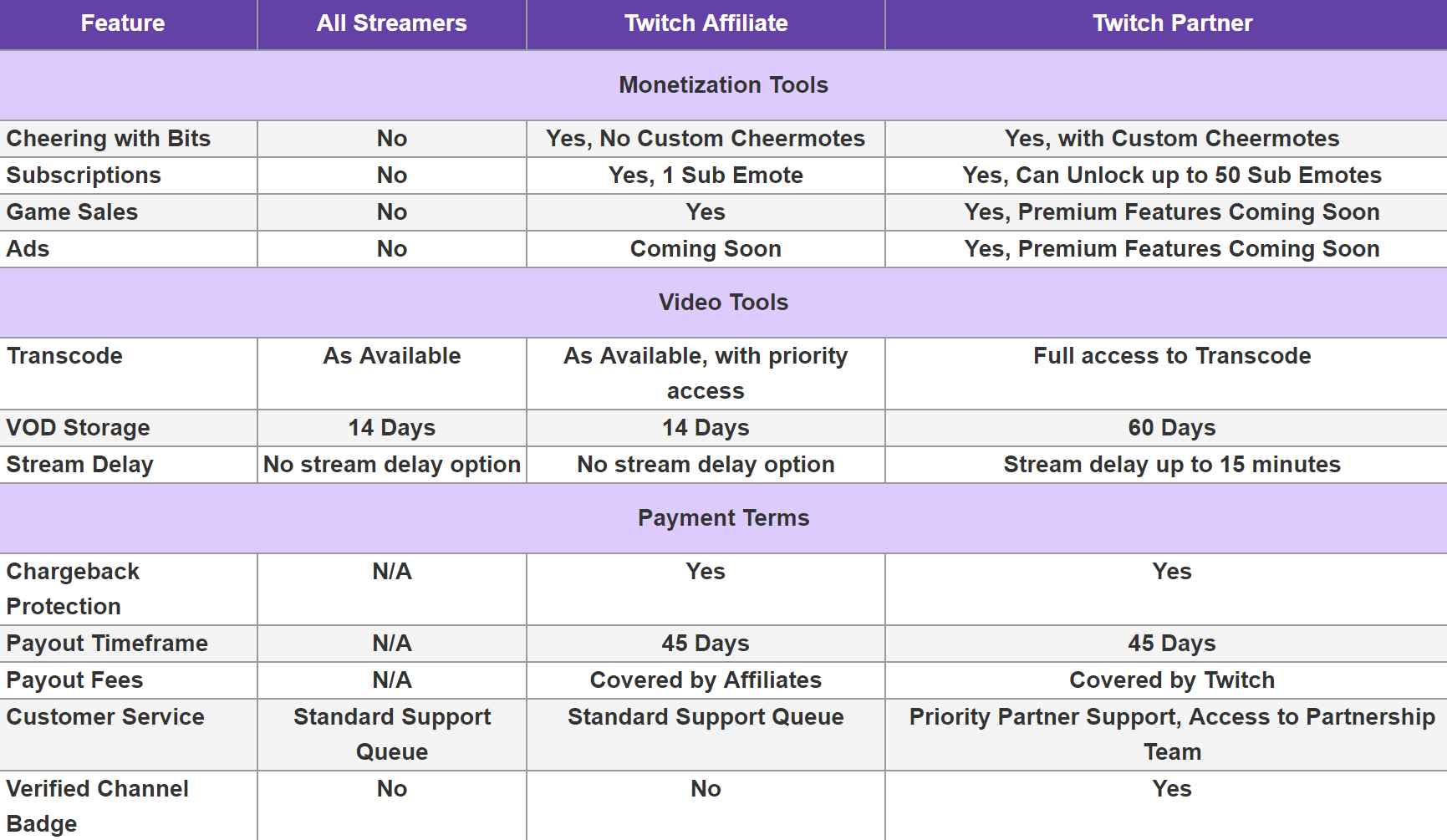
In broad strokes, the affiliate and partner programs have become pretty similar. Affiliates can make money through long-term subscriptions, game sales associated with their channels, and cheers — which basically amount to fans tossing a few coins in streamers’ cups at their leisure using Twitch’s “bit” currency. Affiliates can’t make money from advertisements, but that feature is apparently “coming soon.”
Other differences are granular, but have more of an impact on streamers’ ability to make a living than you might think. That’s where the new affiliate additions come in. Soon, affiliates will be able to create custom badges for their subscribers. This, along with custom sub emotes, directly incentivises their fans to give them money.
They will also get paid sooner, making their financial situations potentially less precarious. All that said, partners and affiliates are still not on entirely equal footing when it comes to money-making possibilities. Partners have access to less tangible benefits, like a dedicated support staff and potential brand and sponsorship deals.
Here’s the thing, though: the affiliate tier was added to Twitch last year as a means of bridging the sometimes insurmountable chasm between hobbyist streaming and an actual career in talking over video games while trying extremely hard not to blurt racial slurs.
By design, the requirements to apply for affiliate status — 50 followers, an average of three viewers per stream, streaming eight hours across seven days within a 30-day period — are much lower than those blocking the way to partner.
On top of that, there was a time when partner status didn’t even have standardised requirements. Instead, it was bestowed on streamers who either had a personal relationship with Twitch or just stuck it out for months and months or even years. Longtime partners feel like near-parity between perks offered to affiliates and partners invalidates the gruelling climb to the top that they had to endure before the affiliate tier even existed.
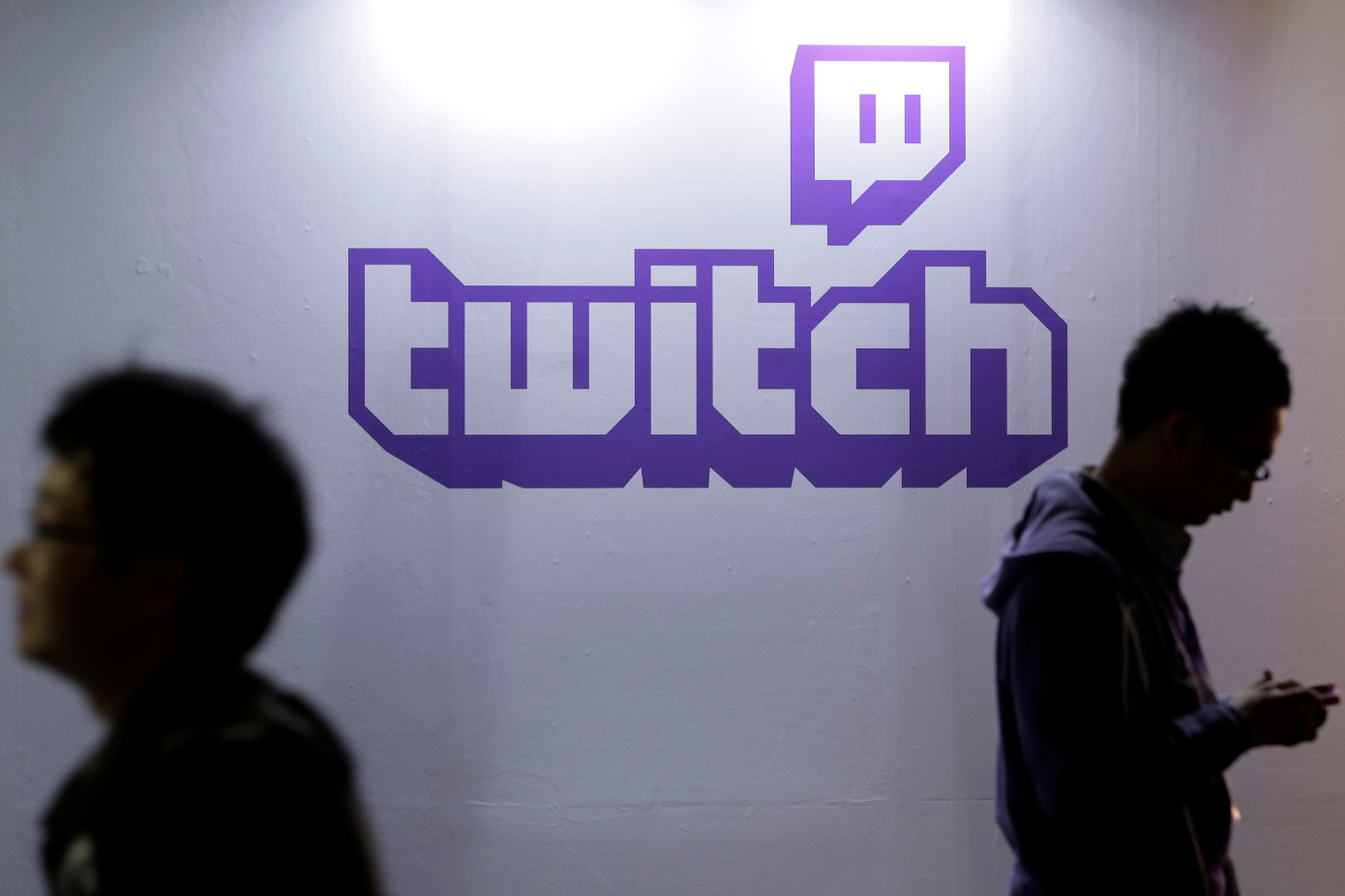
“If Twitch rolled out affiliate to only hard-working streamers who put in the effort, have great content, and deserve the ability to generate revenue, then yes, have all the features! You deserve it,” wrote a Twitch partner named Lt Zonda in a since-deleted post on Twitter. He and many others take issue with the affiliate level’s low barrier to entry.
“I can’t help but feel that streamers I know, who have been grinding for partnership for months, some years, who could not quite reach those partnership requirements, are rewarded with the same perks as ‘my mate Tony who streamed himself having some beers with the lads in the garden a few times,’” he continued.
Another partner, Flowdriver, expressed a similar sentiment, adding that she feels like affiliates need more goals to work toward. “I have no hate for affiliates, and I think it’s great they are getting paid earlier,” she wrote on Twitter. “What I’m saying is, I think things like sub badges should be a partner perk. It gives them something to work for. No hate.”
Even some affiliates aren’t 100 per cent on board with the new affiliate perks. “As an affiliate myself, I am both grateful but frustrated at the recent changes,” wrote a Twitch affiliate named Orbz.
“Yes, it’s great for my channel, but my grind for the past four years seems like I’m being gifted every partner perk without getting partner. Affiliate, I believe, is given out too early to people, and it changes from the love of streaming to money-making in people’s eyes.”
It wasn’t long before other streamers — affiliates and partners alike — started voicing backlash against the backlash. “If you’re complaining about affiliates getting a better deal than before, you’re likely providing bad content,” said a partner named Thorlar on Twitter.
“You actually going as far as being rude to affiliates just shows you’re afraid of them ‘taking over,’ and that’s the saddest part… When did you stop making friends and just allied yourself with other arseholes on the site? That’s not a friendship or business approach. That’s just being an arsehole.”
Others pointed to the widely-held sentiment that Twitch is a community, something that Twitch, the company, has espoused on numerous occasions with rhetoric and slogans like “bleed purple.”
“In the end, no matter what your title is on Twitch, we are all content creators the moment the ‘start now’ button gets pushed,” an affiliate named Nightlyght said. “Differences in opinion are fine but bashing on your Twitch family isn’t. Support each other.”
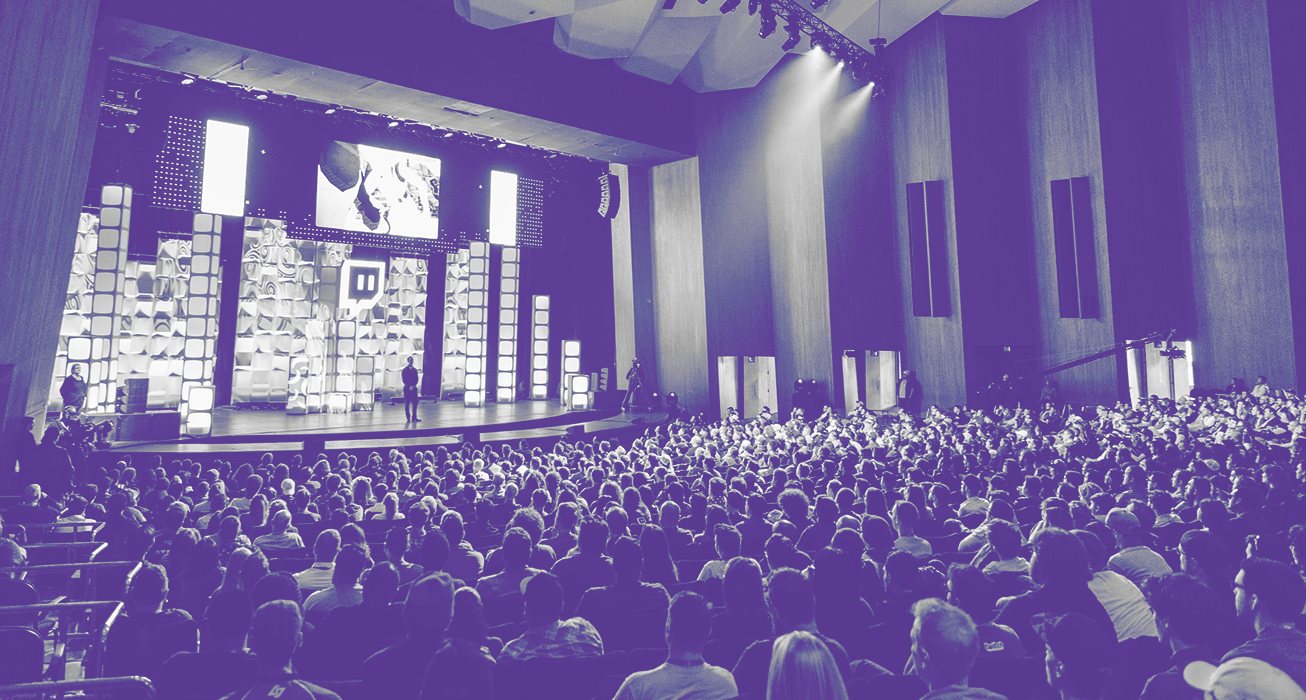
It all leaves Twitch, as a platform, in an odd spot. On one hand, Twitch goes on and on about community until it’s purple in the face, implying that everybody is — on some level — in it together. On the other hand, Twitch is an inherently competitive system. There’s a finite number of viewers, and streamers are vying for their attentions. Gamifying people’s ability to make a living muddies these waters even further.
It taps into a quintessentially game-y mentality that everyone should start from the same point and work toward unlocking a series of concrete, immutable rewards. And so, even as Twitch speaks of community in almost propagandistic terms, people feel pitted against each other in a competition not even to make money and succeed, but to earn the means to do so by ranking up.
This can lead to gatekeeping from people who may not realise they were extremely fortunate to have the time and space to grind their way to partner sans the sort of runway affiliate provides, even if it ended up taking them years. It’s tempting to believe that all Twitch streamers start from the same place and can work their way to fame and fortune through sheer doggedness, but it’s simply not true.
“There are barriers to success on Twitch,” Adam Koebel, a partner who focuses on tabletop role-playing and a variety of games, told Kotaku in a DM. “Technologically, you need to be in a part of the world with a decent internet connection, have access to and afford the hardware required, and have the leisure time to build an audience.”
“There’s a myth that anyone can be successful as a broadcaster that simply ignores those kinds of barriers. It’s a question of equity vs. equality. The assumption that it’s a level playing field to begin with. That assumption is even bigger than affiliation or partnership.”
For some people, then, it was simply impossible to succeed on Old Twitch. Nowadays, they have more options, but there are still plenty of other invisible barriers. Streamers who insist that everybody should experience their same years-long struggle or demonstrate a certain, arbitrary level of dedication to streaming risk becoming barriers themselves. In many ways, Twitch creates these mentalities. It is, Koebel stressed, a capitalist system, and therefore one that encourages a degree of ruthlessness in competition.
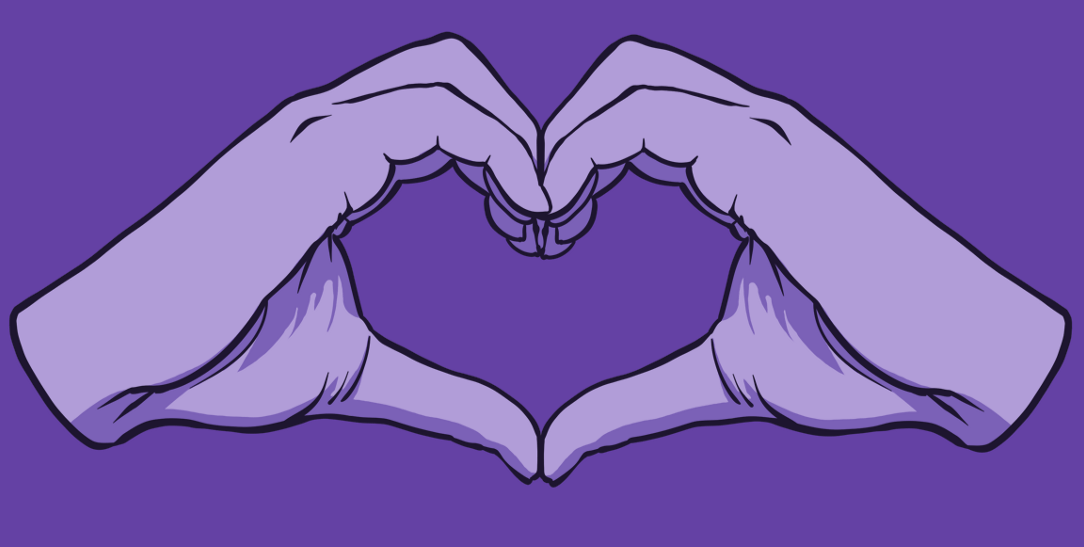
At the same time, he said, Twitch’s pro-community rhetoric isn’t entirely hot air. “On the one hand, ‘bleed purple’ is so much jingoistic bullshit but on the other hand, solidarity is a real thing,” said Koebel. “I came up in Twitch riding the back of a remarkably generous broadcaster named JP McDaniel, who invited me on to his channel as part of RollPlay, exposing me to a huge audience that I eventually invited into my own community, in parts, when that community formed around my stream. I’m trying to do the same for other smaller streamers, especially marginalised folks. This is how that has to work.”
It’s all about striking a balance between that competitive reality and a collaborative spirit, he said, or else Twitch really does become a cutthroat environment in which everybody feels threatened by everybody else’s success. “It’s only as cutthroat as we make it,” he said.
Bryan Veloso, a former Twitch employee-turned-partner who publicly said he was happy for affiliates and left it at that, said to Kotaku that Twitch could at least be doing more to make partners feel like, well, partners.
“At best, the relationship is strained,” Veloso said in an email. “We’re all happy to be partners, but we don’t feel like we matter. There are thousands of stories out there about the ‘horrors’ of communicating with Twitch, disparate opportunities, double standards, favoritism, etc.”
More staff dedicated to handling Twitch’s 20,000-plus partners, he noted, would go a long way toward mending those fences and, perhaps, taking some heat off affiliates, who seem to be getting more attention from the folks building features at Twitch lately.
“Obviously, there’ll always be people that will think any gains on the affiliate end would threaten their territory,” Veloso said. “But if they managed fix the program’s pain points, raise morale, and communicate more with partners, it’d be a step forward something healthier.”
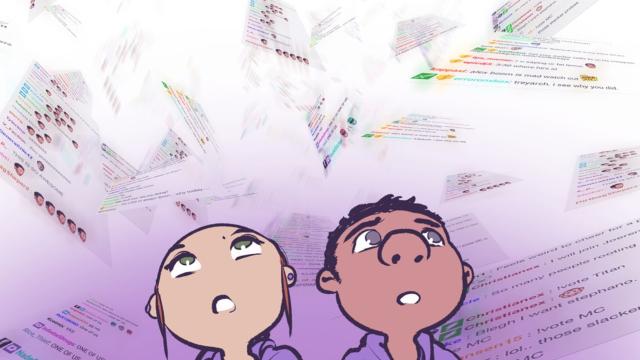
Comments
13 responses to “Twitch Partners Feeling Burned After Affiliates Receive Features That Took Them Years To Earn”
TBH, I’m surprised YouTube hasn’t been aggressively chasing the twitch marketshare.
Actually Mixer, a new streaming platform, is trying to buy up on Twitch streamers fed up with the system.
As is Facebook.
Because YouTube owns twitch.
No it doesn’t.
Amazon owns it.
If a company makes money by getting the community to produce content, then they should probably be sharing some of the revenue with the content creators. So offering monetisation to more creators should be seen as a good thing.
As for expanding some of the partner perks to affiliates, presumably Twitch thinks this will result in affiliates working harder to bring in new subscribers. While it is possible this could be done by one streamer cannibalising another streamer’s viewers, that wouldn’t make Twitch any more money. So presumably they expect it to grow the overall viewer base, or get the existing viewer base to spend more money.
As an affiliate, I say: Awesome! Look forward to playing with some new toys!
…not that I have any subscribers, lol. But an excuse to get down to some pixel art I will welcome.
As an affiliate also, being able to provide sub badges is going to be a valuable tool in building loyalty and repeat viewership. It’s quite unfair that this feature was restricted to Partners in the first place.
Just because the existing partners worked months or years to get recognition on Twitch it doesn’t mean that all future (or current) streamers should have to meet the same mark. Twitch can lower the barrier to entry, which they have to some extent with the affiliates program, big whoop, deal with it.
On the other hand though I did some YouTube and streaming stuff a few years ago. Very small scale but of the streams I did I ended up with around 150 followers and was getting a minimum of 20-30 viewers per stream, peak was much higher. Based on my experience it really isn’t hard to hit that affiliate mark…they should up the requirements a bit and then it will be both a proper reward and also appease the partners a bit in terms of the effort required.
“I had to suffer so everyone else should have to suffer too” is a pretty typical elitist attitude. Mostly they care less about how hard other people have to work to ‘earn’ the same thing they have, and more about how exclusive or prestigious they think the reward should be.
I think more to the point is that the closer an affiliate comes to partnership, the less of a point there is to having a partnership. instead of asking that partners recieve more perks to keep their tier on a higher level they are asking twitch to reconsider the changes they have made.
Is this reasonable? Sure. Should it be done? I don’t use twitch much so I’m not really the best authority on that.
It could be reasonable, but I’m struggling to think of a reason why. Partners aren’t losing anything by affiliates getting more, so why does how big the gap is matter to partners specifically? I can’t think of a reason other than artificial prestige for why more perks for affiliates matters at all to partners.
I hate these kind of people. They act like because they suffered everyone else has to suffer. We all know the types.
Common phrases are “I didnt have Tv and video games in my day, You dont need them either”
“Back in my day…. ”
“Kids have it too easy these days”
It like these people think we should never improve things or make stuff easier and we should perpetually struggle all the time
It’s also the people complaining that want everything for nothing and don’t see why they shouldn’t have the same things as someone who put in 10x more effort and time than they did getting there.
What a load of shit. Christ. You’re not a family or community. You’re all contractors with Twitch making money off your hard work.
As someone working towards affiliate status right now, I’m pretty on-board with all these changes.